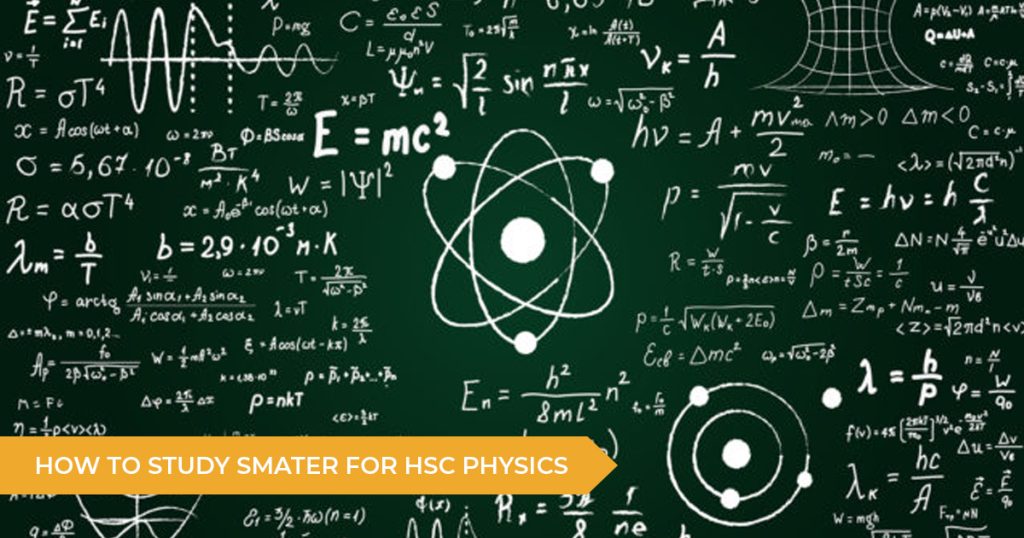For those studying Physics a common question asked is – how do you study for it?

What can HSC students do best to prepare for one of the harder subjects’ they will undertake in their HSC?
The answer is not simple. The old syllabus catered itself towards a style that involved more rote learning, with a focus on extended response questions and lack of mathematical rigour. However, the new syllabus has provided both a need to understand the reasoning behind physical phenomena and to quantify it; qualitatively and quantitatively.
As such learning what is the best way to study may require a lot of trial and error, which students are not at the liberty to do during HSC.
There are 3 main ideas that students should keep in mind when studying HSC Physics:
Prioritise understanding
The first and universally agreed step in studying for physics is understanding. However, understanding is the simplest but the hardest step to truly master. Questions in the HSC exam are rarely identical to a question you have previously studied, but the underlying concepts will be the same, as such having a deep, complete and recallable understanding is key.
Ask why. In class, at school or at your Talent lesson, ask why things happen. Students often blur the ‘why and when’ trying to get an answer to a question on their study for the night. But understanding why things happen takes time and may not provide the same satisfaction as finishing a past paper or homework, but is critical in the long term.
RELATED: How To Revise HSC Physics Before Trial Exams
For example, when understanding Faradays and Lenz’s Law, students may forget the direction of the current generated in a wire when experiencing a change in flux. A deeper understanding shows that the current is oriented such that it generates a magnetic field that opposes the change in flux. Why? In order to conserve energy. As such understanding that all of this happens in a certain orientation due to conservation laws and not by some divine intervention provides a foundation upon which to test all other knowledge.
Lack of root reasons as to why things happen can lead to unwanted stress and holes in knowledge, holes that students may not be aware of up until exams.
Make sure you understand concepts rather than being familiar with in will ensure you have a greater chance at success in physics.
Practice Systematically
Practice seems to be an overstated method when studying but there is a technique that should be developed when doing a wide variety of questions.
First, study any concept before you have a go at questions. Questions and past papers are an extremely valuable resource and aim to revise concepts before tacking them.
Do them under exam conditions. It doesn’t have to be with a timer but don’t look at the solutions until you have a good hard go at any question. A big part of HSC Physics is not only understanding but having good problem-solving skills, which can only be developed by continually resisting with questions, trying different methods, checking your notes, and redoing it.
When you make a silly mistake or get a question wrong, ADD them to your notes. Don’t be ashamed about making mistakes, instead be glad because now you know exactly one more piece of knowledge in the grand scheme that you didn’t know before.
RELATED: HSC Physics Past Papers Master List
Have useful notes
Many student’s notes seem to be shortened or compressed versions of a compiled version of Talent booklets, school notes and textbooks. While this is fine, your notes should also help you remind yourself of gaps in your knowledge you made in the past, and little points you may forget, instead of just statements which you know are already true.
Put these things in. Put silly mistakes in your notes, put questions about a topic you didn’t get wrong in there. Notes do not need to be a professional document – they need to give you something to look back to in order to learn more every time. They should be evolving and changing based on the understanding you gain and the mistakes you will inevitably make over time.
While there is no set-in stone way of studying for physics, and while these 3 tips can be applied in a multitude of different contexts, they are good ideas to keep in mind when preparing and studying for physics.
Excel in Physics this year with the help of Talent 100. Learn more about our Year 11 and 12 Physics course structure, 1-1 tutorials and how we can get you on the right track for the HSC. Click here for more information, or how to get started with Talent 100.




